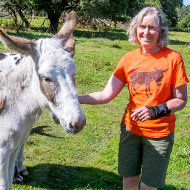
Round two of Nature Networks Fund open for applications.
The Welsh government has opened round two of the Nature Networks Programme to improve biodiversity, with £15 million funding available to applicants.
Helping Wales' natural habitats and creatures to thrive, the funding is available to landowners and managers working with natural heritage in Wales, allowing for better management of sites, and improvements to be made.
In round one of the funding, one site that benefitted was Ffarm Moelyci, situated on the outskirts of Snowdonia National Park.
The farm, which will be applying for the second round of funding, uses rescue donkeys to graze grassland and control invasive bracken.
Ruth Stronge, project leader at Ffarm Moelyci, said: “The donkeys are happy, our volunteers and visitors are happy, our environment is thriving – it’s win-win-win!
“We take great care at Ffarm Moelyci to manage the land as best we can, especially as the farm is an important site that connects historic pasture land to our prized Snowdonia National Park.
“The donkeys have converted a field covered in gorse scrub into an oasis of orchids and butterflies which can spread to nearby farms too.”
Welsh government minister for Climate Change, Julie James, welcomed the work done at Ffarm Moelyci, and encouraged those working with natural heritage in Wales to apply: “Bad land management can mean disastrous consequences not only for our ecology, but for the health of the people of Wales.
“But look what good land management can achieve – with a bit of help our plants, wildlife and communities can thrive!
“Thank-you Ruth, and all those at Ffarm Moelyci – including the donkeys- for your inspirational work.
“I’d like to encourage all landowners and managers to please apply for this funding pot through the National Lottery Heritage Fund, so you can help leave behind a Wales that is bountiful in biodiversity to our future generations.”
Applications are now open for funding, to find out more visit the Heritage Fund website.
Image (C) Ffarm Moelyci / Welsh Government



 The latest
The latest